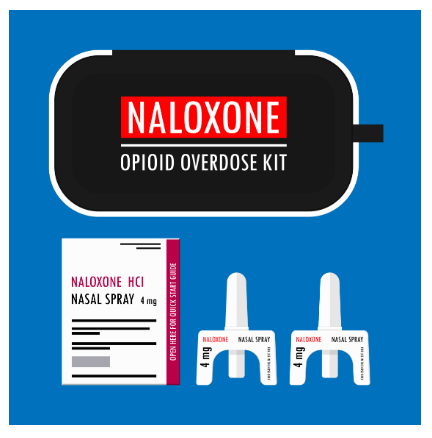
Against the backdrop of the COVID-19 pandemic, the opioid epidemic continues to rage, fueled in part by the mental health challenges that have accompanied COVID-19. The Centers for Disease Control and Prevention (CDC) recently reported an average increase in opioid overdose deaths of 30% during 2020 as compared to the previous year.
During this period, IPRO, the Quality Innovation Network-Quality Improvement Organization for Connecticut, Delaware, the District of Columbia, Maine, Massachusetts, Maryland, New Hampshire, New Jersey, New York, Ohio, Rhode Island and Vermont has been committed to providing nursing homes with quality improvement expertise. This includes technical assistance and education to support facilities in response to both the COVID-19 pandemic and the opioid crisis. IPRO QIN-QIO's work has focused on the appropriate use of opioids and efforts to prevent adverse drug events (ADEs) among vulnerable and high-risk patients.
Education and information regarding naloxone use in nursing homes is limited and represents a serious medication safety gap. In April 2021, IPRO QIN-QIO conducted a Nursing Home Naloxone Assessment to gain a better understanding of the use of naloxone in the nursing homes working with the QIN-QIO. A total of 86 responses were received and showed that: 
- 20.7 percent of nursing homes do not have naloxone in their emergency kit or dispensing machine
- About 50 percent of nursing homes require naloxone to be individually prescribed for use as needed in the event of opioid overdose emergency
- 36.5 percent of nursing homes expressed a desire for naloxone training, protocols, or other opioid related resources
- One facility identified that their emergency naloxone was expired
Based on this data, the IPRO QIN-QIO developed a Nursing Home Naloxone Best Practices webinar to provide guidance on protocols and resources in June 2021. The webinar featured a nursing home consultant pharmacist who reviewed the American Society of Consultant Pharmacists (ASCP) Opioid Stewardship Toolkit for post-acute care. It also included representatives from nursing homes who shared their best practices and discussed a powerful case study regarding a resident who overdosed during his short-term rehab stay. The facility shared lessons learned from this tragic case. Their immediate response included revisiting the facility's naloxone policy; ensuring that they maintain a supply of naloxone; educating clinical staff on recognizing signs of overdose and administering naloxone; initiating a standing order for naloxone for all residents admitted on opioids; and flagging the face sheet for residents with a history of substance abuse. In addition, they conducted drills to prepare staff to respond to an overdose emergency.
In order to maximize spread of this content, the original one-hour presentation was edited down to two shorter learning modules. The first focuses on the ASCP Opioid Stewardship Toolkit. The second focuses on the nursing homes that shared best practices and case studies. IPRO QIN-QIO estimates that this resource has reached more than 265 professionals to date. The video series, promoted as “Nursing Home Naloxone Best Practices,” continues to be shared on IPRO’s QIN-QIO channels and is generating additional interest.
IPRO QIN-QIO followed up on these presentations with an Opioid & Pain Management Best Practice webinar in September 2021. This event featured Jonathan Siff, MD, and Joan Papp, MD, of MetroHealth System, discussing electronic health record integration of a naloxone clinical decision support system. Also featured was an overview of medications to treat opioid use disorder in the long-term care setting by Rob Accetta, RPh, BCGP, President of Rivercare RX Consulting. Continuing medical education credits were provided. A recording of the presentation is available for archived viewing on IPRO QIN-QIO's website.
IPRO QIN-QIO's multi-pronged focus on this crisis continues. The organization recently launched a publicly available Opioid Utilization Dashboard that provides state- and county-level mapping of opioid utilization using Medicare data for four, six-month time intervals. The dashboard contains data points such as overall opioid use as well as opioids prescribed in combination with benzodiazepines. In the near future, the dashboard will also include other dangerous drug combinations as well as health equity and disability data. A video tutorial linked to the dashboard provides an instructional roadmap for navigating the site.
Although IPRO QIN-QIO's initial Nursing Home Assessment is complete, the organization continues to monitor uptake of opioid best practices and identify facilities that are interested in receiving training and information. Through interventions such as these, IPRO QIN-QIOs is committed to reducing the harm, including mortality, resulting from opioid use and misuse across the care continuum.
This material was prepared by The Bizzell Group (Bizzell), the Data Validation and Administrative (DVA) contractor, under contract with the Centers for Medicare & Medicaid Services (CMS), an agency of the U.S. Department of Health and Human Services (HHS). Views expressed in this material do not necessarily reflect the official views or policy of CMS or HHS, and any reference to a specific product or entity herein does not constitute endorsement of that product or entity by CMS or HHS. 12SOW/Bizzell/DVA-1159-07/18/2023

